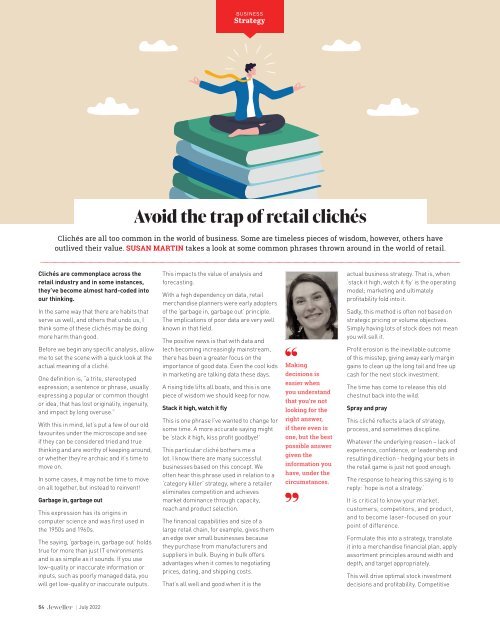Jeweller - July 2022
Door wide open: Lab-grown diamonds have a unique chance to thrive The Ego Game: Personalised jewellery is as popular as ever seen Avoid the trap: The business world is full of cliches - it's time to move on
Door wide open: Lab-grown diamonds have a unique chance to thrive
The Ego Game: Personalised jewellery is as popular as ever seen
Avoid the trap: The business world is full of cliches - it's time to move on
You also want an ePaper? Increase the reach of your titles
YUMPU automatically turns print PDFs into web optimized ePapers that Google loves.
BUSINESS<br />
Strategy<br />
Avoid the trap of retail clichés<br />
Clichés are all too common in the world of business. Some are timeless pieces of wisdom, however, others have<br />
outlived their value. SUSAN MARTIN takes a look at some common phrases thrown around in the world of retail.<br />
Clichés are commonplace across the<br />
retail industry and in some instances,<br />
they’ve become almost hard-coded into<br />
our thinking.<br />
In the same way that there are habits that<br />
serve us well, and others that undo us, I<br />
think some of these clichés may be doing<br />
more harm than good.<br />
Before we begin any specific analysis, allow<br />
me to set the scene with a quick look at the<br />
actual meaning of a cliché.<br />
One definition is, “a trite, stereotyped<br />
expression; a sentence or phrase, usually<br />
expressing a popular or common thought<br />
or idea, that has lost originality, ingenuity,<br />
and impact by long overuse.”<br />
With this in mind, let’s put a few of our old<br />
favourites under the microscope and see<br />
if they can be considered tried and true<br />
thinking and are worthy of keeping around,<br />
or whether they’re archaic and it’s time to<br />
move on.<br />
In some cases, it may not be time to move<br />
on all together, but instead to reinvent!<br />
Garbage in, garbage out<br />
This expression has its origins in<br />
computer science and was first used in<br />
the 1950s and 1960s.<br />
The saying, ‘garbage in, garbage out’ holds<br />
true for more than just IT environments<br />
and is as simple as it sounds. If you use<br />
low-quality or inaccurate information or<br />
inputs, such as poorly managed data, you<br />
will get low-quality or inaccurate outputs.<br />
This impacts the value of analysis and<br />
forecasting.<br />
With a high dependency on data, retail<br />
merchandise planners were early adopters<br />
of the ‘garbage in, garbage out’ principle.<br />
The implications of poor data are very well<br />
known in that field.<br />
The positive news is that with data and<br />
tech becoming increasingly mainstream,<br />
there has been a greater focus on the<br />
importance of good data. Even the cool kids<br />
in marketing are talking data these days.<br />
A rising tide lifts all boats, and this is one<br />
piece of wisdom we should keep for now.<br />
Stack it high, watch it fly<br />
This is one phrase I’ve wanted to change for<br />
some time. A more accurate saying might<br />
be ‘stack it high, kiss profit goodbye!’<br />
This particular cliché bothers me a<br />
lot. I know there are many successful<br />
businesses based on this concept. We<br />
often hear this phrase used in relation to a<br />
‘category killer’ strategy, where a retailer<br />
eliminates competition and achieves<br />
market dominance through capacity,<br />
reach and product selection.<br />
The financial capabilities and size of a<br />
large retail chain, for example, gives them<br />
an edge over small businesses because<br />
they purchase from manufacturers and<br />
suppliers in bulk. Buying in bulk offers<br />
advantages when it comes to negotiating<br />
prices, dating, and shipping costs.<br />
That’s all well and good when it is the<br />
Making<br />
decisions is<br />
easier when<br />
you understand<br />
that you’re not<br />
looking for the<br />
right answer,<br />
if there even is<br />
one, but the best<br />
possible answer<br />
given the<br />
information you<br />
have, under the<br />
circumstances.<br />
actual business strategy. That is, when<br />
‘stack it high, watch it fly’ is the operating<br />
model; marketing and ultimately<br />
profitability fold into it.<br />
Sadly, this method is often not based on<br />
strategic pricing or volume objectives.<br />
Simply having lots of stock does not mean<br />
you will sell it.<br />
Profit erosion is the inevitable outcome<br />
of this misstep, giving away early margin<br />
gains to clean up the long tail and free up<br />
cash for the next stock investment.<br />
The time has come to release this old<br />
chestnut back into the wild.<br />
Spray and pray<br />
This cliché reflects a lack of strategy,<br />
process, and sometimes discipline.<br />
Whatever the underlying reason – lack of<br />
experience, confidence, or leadership and<br />
resulting direction - hedging your bets in<br />
the retail game is just not good enough.<br />
The response to hearing this saying is to<br />
reply: ‘hope is not a strategy.’<br />
It is critical to know your market,<br />
customers, competitors, and product,<br />
and to become laser-focused on your<br />
point of difference.<br />
Formulate this into a strategy, translate<br />
it into a merchandise financial plan, apply<br />
assortment principles around width and<br />
depth, and target appropriately.<br />
This will drive optimal stock investment<br />
decisions and profitability. Competitive<br />
54 | <strong>July</strong> <strong>2022</strong>


















